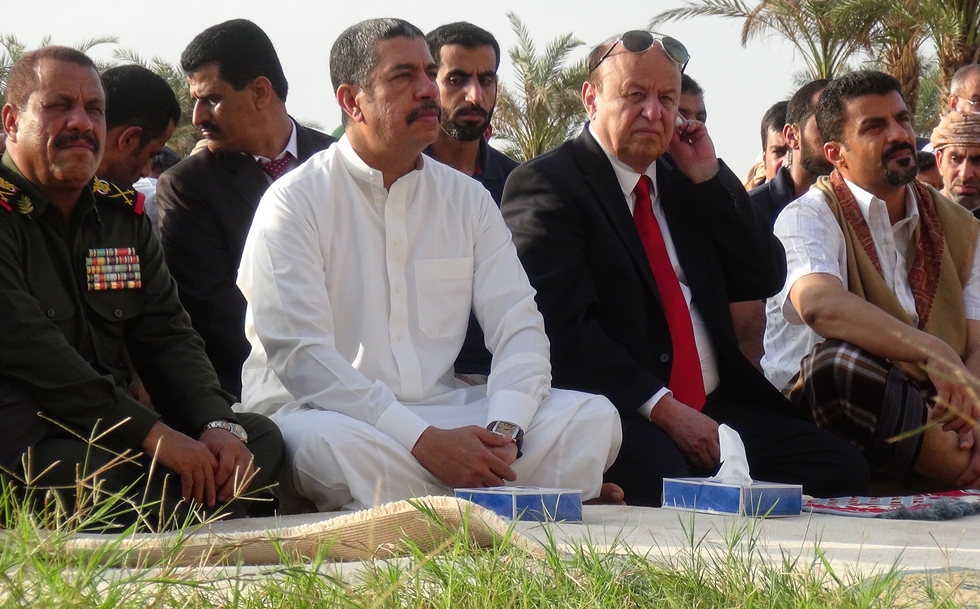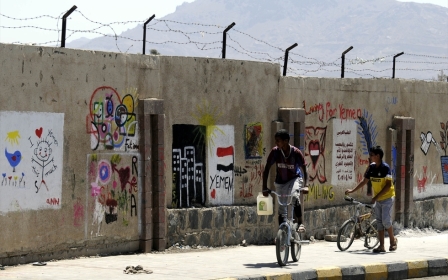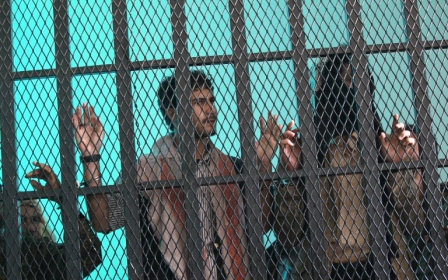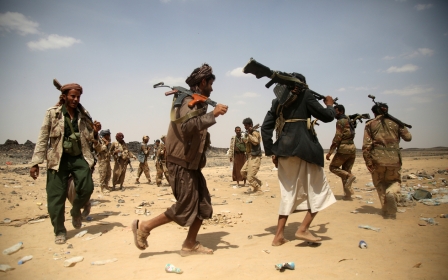Yemen's politics of musical chairs

He was making his way down the hallway with one of his aides, both exchanging light chatter as they walked briskly. Then the aide’s phone pinged, it was his wife.
“Is it true?” she asked
“Is what true?!!” the aide asked back
“Hadi just issued a decree. He’s dismissing Bahah of his duties.”
The aide paused for a moment, not knowing how he was supposed to break the news to his boss, Khalid Bahah, the man standing right beside him. How do you tell the vice president of Yemen that the president had just sacked him?
It is hard to believe, but this is what Bahah’s inner circle insist had happened. With no previous warnings or consultations, Khalid Bahah’s short-lived career as vice president had ended.
Bahah’s aide was hardly the only person to be floored by the news. The shockwave following the announcement on 3 April instantly spread from that hallway in Riyadh, through the accelerating vortex of social media, to reach every Yemeni journalist, analyst, politician and ordinary citizen.
This brutal dismissing of Bahah – who had been appointed through a rare consensual agreement of all political factions – was shocking in more ways than one. To begin with, Hadi had no legal mandate to make such a decision without first seeking the Yemeni parliament’s consensus approval.
Further, Bahah’s short tenure had so far been, by all accounts, fairly commendable. As a technocrat with virtually no political baggage, he had been enjoying the rare distinction of being liked not only by all Yemeni factions but also within international circles too. Even more baffling, Hadi’s choice of replacement, General Ali Mohsen Al-Ahmar, is one of the most controversial political actors in Yemen’s political history.
Most troubling of all, however, is Hadi’s timing, making his seemingly hasty political move a mere week before a long-awaited ceasefire - meant to stabilise the ground for upcoming peace talks - was due to begin.
Whatever Hadi’s intentions, the reaction within the international community, already under immense pressure to secure a swift and lasting resolution to the conflict, suggests that this development will not be allowed to jeopardise current peace efforts.
Indeed, within moments of Hadi’s announcement, the US Secretary of State John Kerry was quick to express his frustration. “I cannot avoid saying that I think that President Hadi has complicated some of those efforts significantly in the last few hours,” he commented, before adding: “I hope that decisions will be made that will facilitate our ability to be able to move towards the negotiations that we have all been working towards on the 18th of April.”
In hindsight, of course, the signs of rupture had been there for some time. A few weeks ago, a photo of President Hadi nudging Bahah out of the way as the two walked beside John Kerry, went viral across Yemeni social media: a picture that said it all.
There was even more happening behind the scenes.
Since his appointment as president in uncontested elections, Hadi had been widely perceived as ineffectual and lacking support even within his own embattled hometown of Aden. An army officer in the former South Yemen, Hadi had backed the wrong side in the South’s internal infighting of 1986. He was forced to flee north to Sanaa, before leading northern forces against southern separatists in the 1994 civil war, securing a position as deputy to Ali Saleh, his predecessor.
In contrast, Bahah quickly garnered admiration across much of Yemen's political spectrum, mainly due to his status as a newcomer to national politics without much of a personal political history. Before his election last year as vice president in Yemen’s unity government, Bahah had held the position of prime minister. Leading a cabinet of respected technocrats, his was called “the government with credentials”.
Bahah’s big ambitions for Yemen’s future were dealt a severe blow when the Houthis took over the capital city, Sanaa, in September 2014, holding him under house arrest. Hadi soon resigned, followed by Bahah himself and his entire governmental team.
Asked at the time whether he would ever consider a return to politics, Bahah replied: “I would do anything to serve my country.”
Soon after the fall of Sanaa, Hadi fled to Aden, where the Houthis followed him, before seeking refuge in Saudi Arabia. As soon as he arrived there, however, he annulled his resignation. As Hadi’s health had deteriorated drastically, the Saudis were very concerned about the prospect of an automatic transfer of power to a Saleh loyalist, and pressured Hadi to appoint a vice president immediately.
Bahah was that choice. He was seen as a consensual figure, who still had lines of communications with both the Houthis and Saleh’s General People's Congress. Crucially, he was also backed by the United Arab Emirates.
Tensions between Hadi and Bahah first surfaced in 2015, when the president replaced the foreign affairs minister, Abdullah al-Saidi. Bahah publicly denounced Hadi’s decision, arguing it was unconstitutional.
“We would be called to a meeting with Bahah and as soon as Hadi would hear about it he would call a meeting at the same time just so that Bahah could not meet with us,” one of Hadi’s ministers, who wishes to remain anonymous, told me. “It was becoming a joke!”
Battle for Aden
However, many believe the fact that Bahah was the first senior member of the government to return to Yemen really tipped Hadi over the line. The international community hailed Bahah’s decision as the first major step towards restoring the government after six months of exile in Saudi and a year of a bloody conflict.
Headlines in the Yemeni and regional press were jubilant, “Yemen’s government returns from exile,” except, of course, that Hadi was not a part of it. As a Yemeni diplomat remarked to me last week, “Exile does things to you, you sit around in fancy palaces but you’re not really able to do your job. And so, the media really plays a big part in your decision making.”
As Bahah’s visits to Aden grew more frequent, President Hadi himself made the trip, and must have realised his vice president had already stolen the limelight. Bahah had set up base in AlQasr Hotel, in Aden, with his government. “Hadi wanted him to return to Saudi, he wanted to be the one in Aden.”
Bahah and his team did return to Saudi when their governmental offices were attacked by al-Qaeda forces.
In the meantime, talk in Saudi Arabia was spreading that it was now time for Hadi to think about a transfer of power, with Bahah being a mentioned as a plausible successor. Hadi was due to travel to the US for treatment and was said to have agreed to the Saudis’ demands. However, sources close to Hadi’s own sons claim that despite promises to that effect, Hadi had no intention of giving up power just yet.
For his part, Bahah lobbied hard for the governmental palace to be repaired swiftly in order to allow him and his team to return to Aden and resume their duties. However, as soon as the repairs were finished, Hadi sent his sons to occupy it, and soon after went there himself. Some have gone as far as to suggest that Hadi himself had orchestrated the earlier attack on the palace.
While it’s relatively easy to understand Hadi’s decision to dismiss Bahah in terms of their personal rivalries and tensions, it is infinitely more difficult to comprehend the rationale behind his choice of replacement. And what did this mean for the situation on the ground?
Aside from his highly controversial legacy and profile, appointing General Ali Mohsen to the vice presidency was also a major blow to the South. Many have thus interpreted Hadi’s concurrent appointment of Ahmed Bin Dagher as prime minister as an obvious offering to southerners.
Mohsen’s appointment is, of course, the more significant political move, placing as it does into a prominent political position - second in line to succeed Hadi - a military leader who still commands respect (and fear) among many northern tribal leaders.
In Bahah, Hadi may have gotten rid of a major rival. But by promoting the general, Hadi and Saudi Arabia hope that Mohsen can bring northern tribes over to the Saudi coalition side. And whilst this plan might have proven a savvy one had Hadi opted for it 12 months ago at the start of the Saudi-led coalition’s military campaign in Yemen, it is bound to be far less effective today, especially since Ali Mohsen’s stock in the North has undoubtedly sustained considerable damage over his support for the Saudi-led intervention.
“We advised Hadi at the beginning that we needed Ali Mohsen, but at the time he was not interested in giving him that much power,” one of Hadi’s advisors told me.
Regional implications
While John Kerry was quick to express his surprise at Hadi’s dismissal of Bahah, many have wondered whether it was really plausible for Hadi to have made such a drastic move without any previous consultations with either his Saudi allies or the Americans.
“No one was consulted, maybe MBS [Saudi Deputy Crown Prince Mohammed bin Salman] and the top circle in Saudi Arabia…but no one else,” a high-level diplomat told me.
In this context, we might be seeing in Hadi’s move another example of Saudi Arabia's apparent new policy towards the Muslim Brotherhood and its affiliates: to reconstitute a regional, Sunni-based alliance against Iran and its allies. However, the appointment of Ali Mohsen was definitely going to anger the UAE, who have invested a lot in Yemen’s battle.
Domestically, Hadi’s move may be the strongest indication yet that Riyadh’s plan for Yemen no longer centres on defeating the Houthis per se, but on restoring a military ruler with Saudi backing. After nearly a year of stalemate in the North, it seems the Saudis had no other choice.
Their calculation assumes that war will continue in Yemen unless a leader can bring strong northern leaders from both tribal groupings to the table. And while this will certainly prove difficult, Ali Mohsen is far more likely to accomplish that difficult task than Bahah or Hadi himself, though he would face as many challenges as Hadi in bringing peace and unity to the country.
It is clear from this round of Yemen’s political musical chairs that everyone with a seat has a political move they need to play. Everyone, that is, but President Hadi himself, who has exhausted all his moves but is today little more than a puppet of legitimacy.
However, doesn’t President Hadi’s appointment of Bin Dagher and Ali Mohsen, without consulting parliament render him and his government illegitimate? With Bahah back in Riyadh now, I wonder what the next round of musical chairs will have in store for us. Could this really be the end of Bahah? Or is he fated to make another shock comeback to frontline politics? Neither would be particularly surprising. As the last few years, and months, have shown: in Yemeni politics, anything is possible.
- Nawal Al-Maghafi is a Yemeni-British journalist and filmmaker. She has had her work featured on Channel 4, BBC Newsnight, BBC World and BBC Arabic, amongst others.
The views expressed in this article belong to the author and do not necessarily reflect the editorial policy of Middle East Eye.
Photo: Yemeni President Abd Rabbuh Mansour Hadi (2nd R) and Prime Minister Khaled Bahah (2nd L) attend prayers for the Muslim holiday of Eid al-Adha at the presidential palace in the southern city of Aden on 24 September 2015 (AFP).
Middle East Eye propose une couverture et une analyse indépendantes et incomparables du Moyen-Orient, de l’Afrique du Nord et d’autres régions du monde. Pour en savoir plus sur la reprise de ce contenu et les frais qui s’appliquent, veuillez remplir ce formulaire [en anglais]. Pour en savoir plus sur MEE, cliquez ici [en anglais].





